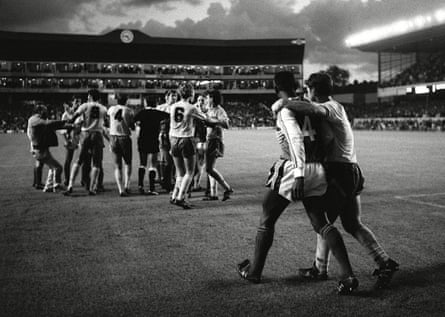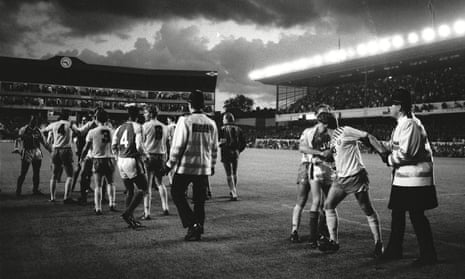Freedom, joy and love may have been filling the air as the Berlin Wall fell in November 1989, but there was not much of this goodwill in evidence on English football pitches. Players brawled at a League Cup game between Wimbledon and West Ham, and a league match between Crystal Palace and Tottenham. Paul McGrath was fined £8,500 for criticising his former manager Alex Ferguson in a newspaper article. York manager John Bird was arrested after a confrontation with Scarborough boss Ray McHale.
And, before all that, a league game between Arsenal and Norwich at Highbury on 4 November 1989 ended with police on the pitch. The afternoon had begun with the players of both clubs applauding David O’Leary on to the pitch. Collecting a commemorative vase and a shirt with No 622 on the back, O’Leary acknowledged the adulation of the players and fans as he broke George Armstrong’s appearance record for Arsenal. Yet the pleasantries ended there; throughout the match, Arsenal’s record breaker would be involved in a running battle with Norwich striker Malcolm Allen.
The match itself provided drama and entertainment aplenty. Norwich, who started the day in sixth place, level on points with fourth-placed Arsenal, took a 2-0 lead in the first half through goals from Allen and Dave Phillips. The latter was the result of a free-kick awarded after O’Leary had fouled Allen, as the two continued their tetchy battle.
O’Leary was so incensed that his protests led to referee George Tyson showing him a yellow card on his special day. But soon it would be the turn of the visitors to question the actions of the official. After Niall Quinn scored to get Arsenal back into the match in the 50th minute, Tyson awarded Arsenal a generous looking penalty for a handball against Andy Linighan. Lee Dixon fired the penalty past Bryan Gunn to level the game at 2-2, while the Norwich players looked on in frustration. Tim Sherwood put Norwich back in front in the 77th minute, only for O’Leary to bring Arsenal level again, scoring his first league goal in six years.
And then, as the match neared its conclusion, Tyson took centre stage once more. When Michael Thomas fell in the box, the referee pointed to the spot. It looked as if Thomas had been backing into Norwich defender Ian Butterworth, but Tyson awarded a penalty and the already simmering tension cranked up a notch or two. Gunn saved Dixon’s effort – his second penalty of the night and the second of his Arsenal career – but the keeper spilled the ball and Dixon scored the rebound, his half-hit shot just about creeping over the line. And then it kicked off.
Already aggrieved at the injustice of the decisions that had led to the their 4-3 defeat, the mood of Norwich’s players darkened further. Alan Smith was shoved into the net as he followed Dixon’s effort over the line. Initially, Arsenal players celebrated the winner, before spotting that Smith had been surrounded. Many players charged from the halfway line to lend their support, as Tyson, police officers and stewards moved in to separate the players.

In truth, there appeared to be a lot of pushing and shoving, but nothing too serious – although there were reports of Smith receiving a cut above his eye and of Dale Gordon punching Nigel Winterburn. At first, Tyson told the press he would not be including the incident in his match report. “After the match Tyson, one of the league’s most experienced referees, hurried away from Highbury like a man leaving the scene of an accident,” reported David Lacey in the Guardian. “No, he said, he was not going to report what happened at the end. Nor were the police prepared to take action. They were happy to let the matter rest and so was he. ‘It was a game of football I enjoyed,’ he added.”
The players were roundly criticised in the newspapers in the immediate aftermath – in the Guardian, David Lacey said they behaved “like drunken sailors in a dockside brawl” – although the referee also took some blame. Speaking on Saints and Greavsie, Jimmy Greaves said the referee’s “bad decisions” had been “instrumental” in causing the brawl. That being said, Greaves did not think there needed to be any repercussions. “As the Norwich player said, they were all having a pint in the bar after the game and that should be the end of it.”
That was not the end of it. After being put under pressure by the FA and the media, Tyson changed his mind. “There is concern about players’ getting involved in situations that bring discredit on the game,” said FA chief executive Graham Kelly.
The FA charged both clubs and ordered a hearing at Lancaster Gate. You would have thought that the players would want to low profile in the meantime, but the hits just kept on coming. Norwich fined Gunn two weeks wages after he openly criticised the Arsenal players for their aggressive approach. And Arsenal handed out the same punishment to Paul Merson and Steve Bould after they were involved in a drunken incident at a dinner celebrating the club’s title win.
Both clubs sent their chairmen, managers, secretaries and captains along to the hearing. The FA had no power to deduct points, so both clubs expected a fine. Norwich were fined £50,000 and Arsenal just £20,000, the FA indicating that they felt the trouble was instigated by the visitors on the day.
Naturally, not everyone agreed with the verdict. “We are disappointed in the differences between the fines of the two clubs,” said Norwich chairman Robert Chase. Alan Eastwood, the chairman of the Police Federation, was furious at how little the clubs were fined: “This was their chance to show that they meant business in cracking down on indiscipline and they funked it. The fine is meaningless – and so is the body which decided it. These offences demanded a reduction in league points. Any sort of fine would have been a joke, but these amounts are totally meaningless. It’s what they pay for a player in the GM Vauxhall League.”
“The police are disappointed that points were not deducted and Graham Kelly says the rules will be changed to accommodate that kind of action in future,” wrote Steve Curry in the Express. This part of proceedings was very important. The next time Arsenal were involved in a brawl on the pitch – the Battle of Old Trafford in 1990 – the club was deducted two points, due to their previous misdemeanours.
It is interesting to look back at the fuss surrounding the brawl. The fact that Tyson wasn’t going to report it and that the players put their differences aside to share a drink afterwards suggests the whole episode was much ado about nothing. Yet a combination of outraged journalists and the desire of the FA to clamp down on perceived blemishes in the game inevitably led to the Lancaster Gate meeting. Was it really that bad, though? Let’s be honest, the pushing and shoving at the end of the match at Highbury provided a very entertaining finish to an already exciting afternoon.

Comments (…)
Sign in or create your Guardian account to join the discussion